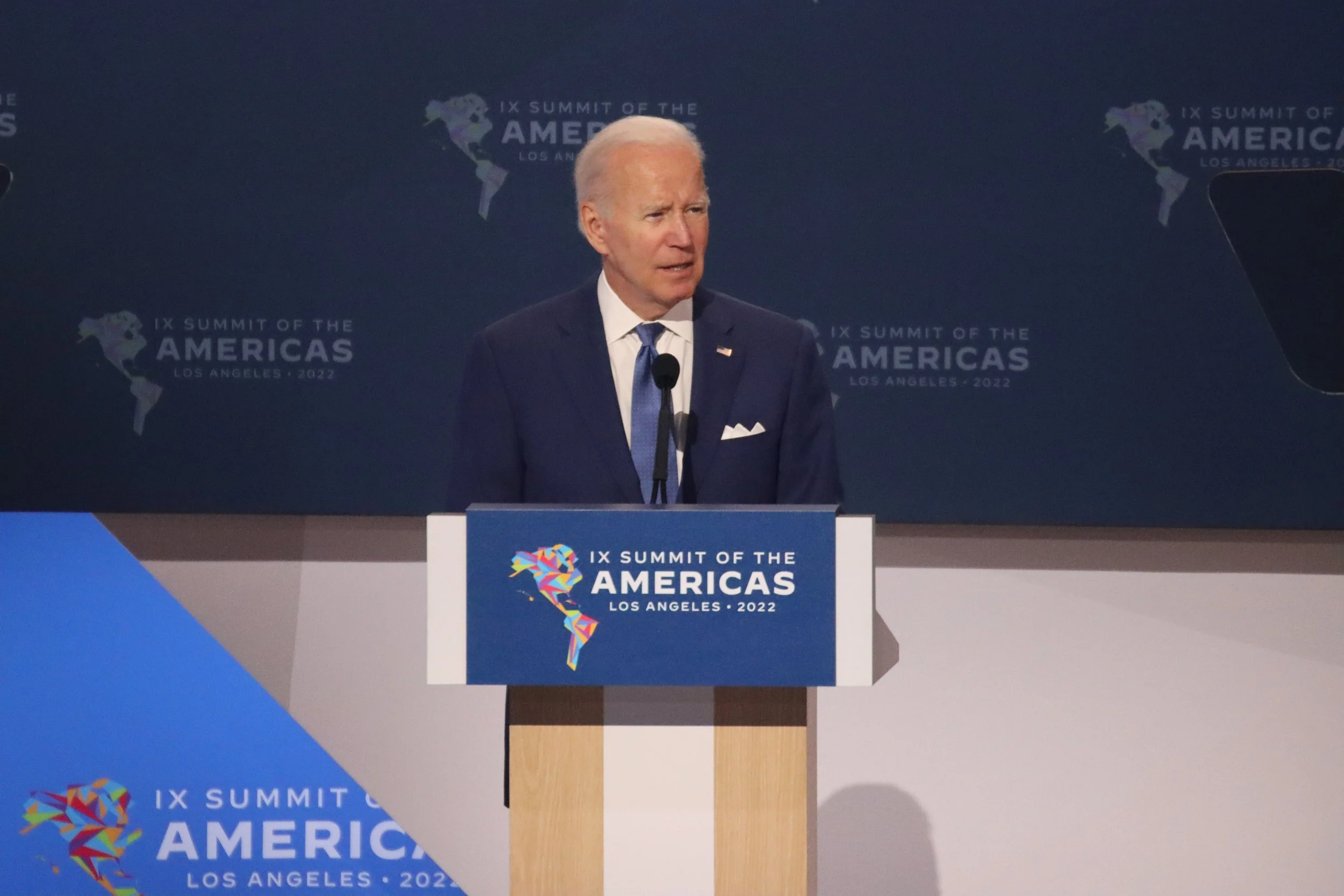Ninth Summit of the Americas Commences in Los Angeles
United States President Joe Biden speaks during the opening plenary session of the Summit of the Americas, June 9, 2022, in Los Angeles, California (Andrew McKeough/AKSM Photography).
Leaders from across the American continents spoke at Summit events throughout the weekend to work on issues that impact the countries of the Western Hemisphere.
Article by Emily Barkann, Chief White House Correspondent
LOS ANGELES - From June 7th to 9th , world leaders from the American continents gathered in Los Angeles to focus and deliberate on “building a sustainable, resilient, and equitable future” during the ninth Summit of the Americas. This year, the Summit included the region’s government leaders, the private sector, and thirteen international organizations. The Summit, hosted by the United States, allowed a variety of high-profile leaders the opportunity to speak to attendees and each other, including President Joe Biden, Vice President Kamala Harris, Secretary of State Antony Blinken, President of the Republic of Ecuador Guillermo Lasso, and President of the Republic of Peru José Pedro Castillo, among many others. This year’s Summit involved ample conversation surrounding the state of COVID-19 in the hemisphere, the use of natural resources throughout the region, the looming introduction of the Metaverse, and economic growth and stability.
The Summit presented multiple opportunities for “greater dialogue between heads of government and the people and businesses of the Americas to address hemispheric challenges and opportunities,” according to the U.S. Department of State. In addition to the three stakeholder forums which included the Fourth CEO Summit of the Americas, the Ninth Civil Society Forum, and the Sixth Young Americas Forum, the Summit also hosted the Media Summit of the Americas. The Media Summit provided the chance for attendees to further examine truth telling in journalism, the effects of disinformation, and the responsibility of governments in supporting media integrity.
The gap in development, success, and stability amongst the wide variety of American countries and corporations is highly visible and cause for concern for many of the heads of state and heads of international organizations from the region. “There is an urgent need for concerted international action and a comprehensive set of policy responses at the national level. The aim of all of this is to build more prosperous, democratic, equitable and fair societies in our region,” President Castillo shared with attendees. “My administration believes that building a sustainable, resilient, equitable future in the Americas requires coordinated action among our countries. It is also essential for states to work together with the private sector. It is the private sector that generates the development of our people,” Castillo said.
The private sector is integral in the ongoing collaboration amongst the region’s nations. As the COVID-19 pandemic is seemingly beginning to wane, many Latin American and Caribbean countries are suffering in the aftermath; supply chain difficulty leaves many of these nations with fewer supplies and insufficient healthcare (including vaccines) for citizens. “When you have solid private public partnerships, you gain more success…COVID proved to us that no one government and no private sector entity could take care of it by themselves,” Xavier Becerra, U.S. Secretary of Health and Human Services, said at the CEO Summit of the Americas.
While COVID-19 was at the forefront of this year’s Summit, the world leaders also discussed the need for the continuation of cooperation amongst the region, the positive effects of tourism on the region’s economies, and the increased support of small businesses across the Americas. “A prosperous region benefits all our economies and creates opportunities for our people,” Vice President Kamala Harris said.
This year’s Summit was not without controversy. Given the United States’ refusal to invite Cuba, Nicaragua and Venezuela due to claims that the countries lack free and fair elections and commit human rights violations, some leaders including Mexican President Andrés Manuel López Obrador and Bolivian President Luis Arce stated they would not attend the Summit unless all American heads of state were invited. The United States withheld an invitation to these countries on the grounds that the goal of the Summit is to help democracy progress, and the countries that were not invited have not contributed to the continuation of democratic efforts in the region.
The decision gained ample criticism from various members of the domestic and international community. Despite the criticism, President Biden maintained that these nations would not receive an invite to the Summit and instead switched his focus to ensure that heads of state from countries that criticized the decision still agreed to attend.
The Summit of the Americas is the only hemispheric meeting of leaders from the countries of the Americas. Former United States President Bill Clinton “convened the first Summit of the Americas in Miami, Florida, in December 1994 to promote economic growth and prosperity throughout the Americas based on shared democratic values and the promise of increased trade and commerce to improve the quality of life for all peoples and preserve the hemisphere’s natural resources for future generations,” according to the official State Department website. This is the second time the United States has hosted the Summit, and the first time since the inaugural meeting in Miami.
